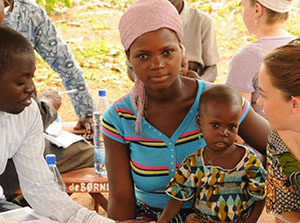
Some two billion people around the world consume a diet lacking the nutrients needed to live healthy and productive lives. The world community is reacting with increasing urgency, focusing especially on addressing global undernutrition among pregnant women and children under two years of age.
Peace Corps identified nutrition as a key focus area of its interventions under Feed the Future, the United States government’s global hunger and food security initiative. In 2011, Peace Corps and the United States Agency for International Development (USAID) signed the Global Food Security Agreement and established the USAID/Peace Corps West Africa Food Security Partnership (WAFSP) to provide improved food security training to Peace Corps Volunteers (PCVs) worldwide.
In 2013 SPRING assisted Peace Corps and WAFSP with introducing and rolling out the Essential Nutrition Actions package in five West African countries (Benin, Gambia, Guinea, Senegal, and Sierra Leone) by facilitating a training of trainers (TOT) for Peace Corps staff and developing action plans in the five countries; facilitating three trainings jointly with three Peace Corps offices in Benin, Guinea, and Gambia; and drafting, testing, and finalizing Peace Corps training materials to be used by Peace Corps staff and volunteers.
The training aims to empower Peace Corps Staff, Peace Corps Volunteers (PCVs), and Community Volunteers (CVs) with knowledge and proven-effective messages on women’s nutrition, infant and young child feeding (IYCF) practices, the importance of micronutrients and hygiene practices, and the basics of homestead food production (HFP).
The complete training package consists of a reference handbook, an orientation guide, a training guide for all PCVs, and a training guide for Peace Corps health volunteers.
About This Orientation Program
Its purpose is to provide PCVs and their counterparts with relevant nutrition knowledge on women’s nutrition, infant and young child feeding, micronutrients, and the importance of hygiene. At the end of the orientation, participants will be able to describe the nutrition situation in the country or region where they are working, as well as key nutrition and hygiene practices, and how and where to deliver messages about these practices.
It is intended for pre-service or in-service training for PCVs who will initiate activities related to nutrition, hygiene, or IYCF. It represents the minimum level of nutrition knowledge recommended for PCVs who will not receive additional nutrition training.